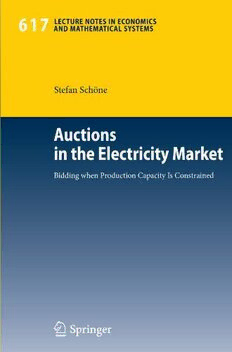
Auctions in the Electricity Market PDF
230 Pages·2009·24.863 MB·English
Most books are stored in the elastic cloud where traffic is expensive. For this reason, we have a limit on daily download.
Preview Auctions in the Electricity Market
Description:
Electricity is an essential commodity traded at power exchanges. Its price is very volatile within a day and over the year. This raises questions about the efficiency of the trading rules.The author develops a non-cooperative auction model analyzing the bidding behavior of producers at power exchanges. Producers are limited by the production capacity of their power plants. Production costs are affiliated. This allows for independence or positive correlation. The author analyzes and compares a uniform-price, a discriminatory, and a generalized second-price auction. Optimal bids, cost efficiency, profits, and consumer prices are examined. A simple probability density function of affiliated production costs is given and used for examples. Numerical results are presented.The results of the analysis can help improving the bidding strategies of producers, selecting the best auction type at power exchanges or detecting price manipulations.
See more
The list of books you might like
Most books are stored in the elastic cloud where traffic is expensive. For this reason, we have a limit on daily download.
